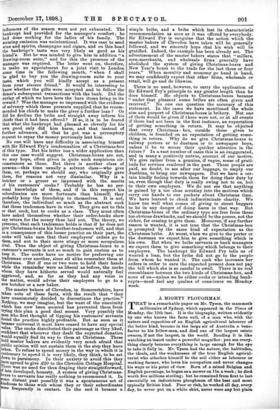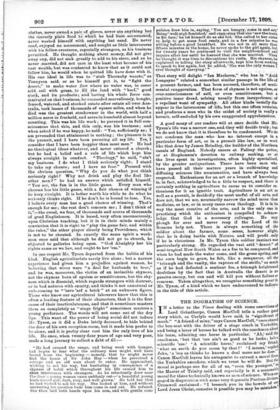A MIGHTY PLOUGHMAN. T HAT is a remarkable paper on Mr.
Tyson, the mammoth millionaire of Sydney, which appeared in the Times of Monday, the 12th inst. It is the biography, written evidently by one who knows the facts well, of a man who, with the nature and capacities of an English agricultural labourer of the better kind, became in the large air of Australia a bene- factor to his fellow-men, and died one of the largest estate owners, if not the largest, in the world. Reading it is like watching an insect under a powerful magnifier : you see every- thing clearly because everything is large enough for the eye to take it fully in. Mr. Tyson had the nature, the habitudes, the ideals, and the weaknesses of the true English agricul- turist who attaches himself to the soil either as labourer or working farmer, who loves his occupation and never changes his ways or his point of view. Born of a mixed Belgian and English parentage, he began as a mower on 15s. a week ; he died worth five millions sterling; but he remained from first to last essentially an industrious ploughman of the best and most British kind. Poor or rich, he worked all day, every day, he never put on a white shirt, never wore any but plain
clothes, never owned a pair of gloves, never ate anything but the coarsely plain food to which he had been accustomed, never washed himself with anything but sand. He never read, enjoyed no amusement, and sought as little intercourse with his fellow-creatures, especially strangers, as his business permitted. He thought nothing about money, did not give away any, did not seek greatly to add to his store, and as he never married, did not care in the least what became of his vast wealth, but was contented to know that as it could not follow him, he would when he quitted life have done with it.
His one ideal in life was to "stub Thornaby waaste," as Tennyson said, or as he himself put it, to "fight the
desert," to make water flow where no water was, to cover arid soil with grass, to fill the land with "beef," good stock, and its products ; and having his whole force con- centrated on that business,-he -succeeded marvellously, bought,
fenced, watered, and stocked estate after estate all over Aus- tralia, took leases of thousands of square miles, and when he died was the greatest stockowner in the world, with half a million acres in freehold, and acres in leasehold almost beyond counting. This was his life work ; he pursued it in full con- sciousness that this, and this only, was his business ; and when asked if he was happy, he said : " Yes, sufficiently so ; I am persuaded that attainment is nothing ; the pleasure is in the pursuit, and I have been pursuing all my life. Yes, I consider that I have been happier than most men." He had no theological ideas whatever, and never entered a church ; but he had a belief and a rule of life which kept him always straight in conduct. "Theology," he said, "ain't my business. I do what I think seriously right; I stand to take my chance ; and I have no fear." Pressed with the obvious question, " Why do you do what you think
ierionsly right ? Why not drink and play the fool like other men P " he had an answer which satisfied, himself. " Yon see, the fun is in the little game. Every man who
chooses has his little game, with a fair chance of winning if he keep straight. It is better worth his while to do what he seriously thinks right. If he don't he is bound to lose. . Yes, I believe every man has a good chance of. winning. That's enough for me ; the rest don't concern me ; I don't think of it,"—the creed, we fear, of thousands and scores of thousands of good Englishmen. It is based, very often unconsciously, upon Christian teaching, but it is in their minds mainly a conviction that it is right to "play the game fair, and within the rules," the other player clearly being Providence, which is not to be cheated. In exactly the same spirit a work- man once said that although he did not go to church, he objected to galleries being open. " God Almighty her his rights same as we hey, and ought to hey 'em."
In one respect Mr. Tyson departed from the habits of his kind. English agriculturists rarely live alone ; but a narrow experience had given him a prejudice against women, be believing that wives were "a deal for husbands to bear," and he was, moreover, the victim of an invincible shyness, not the shyness born of egoism or sensitiveness, but the shy- ness which is dissocial, which regards strangers with distrust, or in bad natures with enmity, and thinks it not unnatural or unbecoming to "'eave 'arf a brick" at an unknown figure. Those who know our agricultural labourers know that this is often a leading feature of their characters, that it is the first cause of their inarticulateness, and that it sometimes masters them as completely as "stage fright" sometimes masters a young performer. The words will not come out of the dry lips. This want of the power of being social did not induce Mr. Tyson, as it did a Duke lately deceased, to hide behind the door of his own reception-room, but it made him prefer to be alone, and it is pretty clear cost him the only love of his life. He once, when twenty-four years of age and very poor, made a long journey to collect a debt of £5 :—
"He had crossed the range, and being weak with hunger, had begun to fear what the ordinary man might well have feared from the beginning — namely, that he might never find the house of Sir John Hay —when he perceived a cottage and an old man about to enter. He approached, wishing to ask his way, but hesitating in consequence of a shyness of habit which throughout his life caused him to shun intercourse with strangers. As he reluctantly drew near the door a young woman came suddenly out—' a beautiful young bush-reared girl, dark, rosy, and well grown.' He told her that he had wished to ask his way. She looked at him, and without answering his question bade him come in and eat. He refused. She then laid both hands upon his arm, and with gentle com- pulsion drew him in, saying, ' Yon are hungry, come in and eat,' Being' well-nigh famished,' and supposing that she 'saw the truth in his face,' he leti himself do as she bid. She called to her sister to help to get some food ready, and in a few minutes be wail sitting before a good, breakfast. He was not in all more than fifteen minutes in the house, he never spoke to the girl again, but for twenty years he continued to visit the neighbourhood and inquire after her until he learned that she was married. Then he thought it was time to discontinue his visits. His shyness, he explained in telling the story afterwards, kept him from seeking fo speak to her again, but he added, ' She was the only woman I ever thought of marrying.' "
That story will delight "Ian Maclaren," who has in "Auld Langsyne " related a somewhat similar passage in the life of a peasant faimer, and has been accused, therefore, of senti- mental exaggeration. That form of shyness is not egoism, or over-consciousness of self, or even sensitiveness, but a positive inner dread, arising usually from inexperience, of a repellent want of sympathy. All other kinds usually dim.
appear in the intercourse of .life, but this ene often remains, and produces a man who in the midst of society is really hermit, self-secluded by his own exaggerated apprehensions.
A good many of our readers will at onee decide that Me, Tyson's life was a narrow one, and they will decide trnly; bat we do not know that it is therefore to be condemned. We do not condemn the man who has no interest except in a particular form of art, or in a pursuit like law, or in work like that done by James Brindley, the builder of the Northern canals of England. Nobody sneers at Palissy the potter, or at Stephenson's devotion to railway making, or at the lives spent in investigations, often highly specialised, by the greater antiquarians. There have been men who have passed all their mature years in cultivating and diffusing sciences like numismatics, and have always been respected. Enthusiasm for an art or a branch of knowledge is, in fact, acknowledged to be a title to respect, and there is certainly nothing in agriculture to cause us to consider en- thusiasm for it an ignoble trait. Agriculture is an art as
well as .a pursuit, is decidedly the most useful of all arts, and does not, that we see, necessarily narrow the mind more than
medicine, or law, or in many cases even theology. It is in its way the most creative of the arts, and is the only one in practising which the enthusiast is compelled to acknow.
ledge that God is a necessary colleague. He may plough for ever and never reap if the Lord of the Seasons help not. There is always something of the soldier about the farmer, some sense, however slight, that he is doing battle with Nature, and will profit only if he is victorious. In Mr. Tyson this soldier instinct was particularly strong. He regarded the vast arid "desert" A semi-tropical New South Wales as a foe to be conquered, and when he had made the water come, and the grass spring, and the corn begin to grow, he felt, like a conqueror, all the "triumph and the vanity, the rapture of the strife," as much as if he had defeated a sentient foe, a triumph heightened doubtless by the fact that in Australia the desert is no passive enemy, but can and will kill you without failure or remorse. Taken altogether, we recognise something great in Mr. Tyson, of a kind which we have endeavoured to indicate in the title of this article.











































 Previous page
Previous page